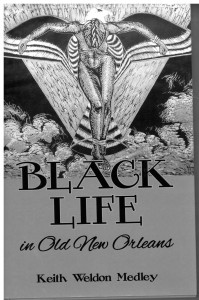Local author’s recent work covers 300 years of black trailblazers
23rd February 2015 · 0 Comments
By Kelly Parker
Contributing Writer
During February, the East Bank Regional Library has hosted appearances by eight authors of fiction, nonfiction, anthology, art, romance and Mardi Gras; one being native Keith Weldon Medley. His latest book, Black Life in Old New Orleans, encompasses 300 years of history focusing on African-American communities’ social, cultural, and political pasts. From Mardi Gras and Congo Square, to Old Treme, and figures such as Louis Armstrong and Fannie C. Williams; a comprehensive account of the Black experience is created in this work. Medley will be on hand for a book signing; February 25th- at the Library, 4747 West Napoleon Ave., Metairie, at 7 p.m.
“His book is interesting, because it’s something that you don’t get to see very often,” says Chris Smith, manager of Adult Programming for the library. “It should appeal to lots of our history lovers.”
 The St. Augustine High School and SUNO alum is also the author of We as Freemen, which brought to life many of the players in the 1896 landmark trial of one of the Supreme Courts most infamous decisions, Plessy v. Ferguson.
The St. Augustine High School and SUNO alum is also the author of We as Freemen, which brought to life many of the players in the 1896 landmark trial of one of the Supreme Courts most infamous decisions, Plessy v. Ferguson.
Rife with detailed histories of Faubourg Tremé, Congo Square, and many other pivotal locations, his subjects in this recent work include the Mardi Gras Indians, the Zulu Parade, and Louis Armstrong and his upbringing in Black Storyville. Tales of many other New Orleanians also fill the pages, such as educator and civic leader Fannie C. Williams, civil rights attorney A.P. Tureaud and some of which, we may not know.
‘It goes from the 1790s to the 1960s taking all types of snippets from Black New Orleans,” he says. “Louis Armstrong is covered and his life-growing up. There’s a lot of things about his life many people don’t know about- also local Freedom Riders from the Civil Rights Movement. I tried to get the stories out on these (many unknown) people, so that others would be aware of their accomplishments.”
Medley was working on a political campaign; when he learned about Ernest Wright, who was like ‘the Martin Luther King of his era-in the ‘30s to the 1950s.’ he told The Louisiana Weekly.
He knew of Wright’s daughter from college, but did not know much about his contributions and impact. Wright was the founder of the People’s Defense League.
“I realized many people didn’t know about him and all of these stories about Black New Orleans. I decided to start writing about it. So many people had so many stories that were pushed to the side,” he said.
Medley decided to bring those stories of the past to the forefront. Black Life in Old New Orleans is 15 chapters; each one self-contained, the author explains.
“Allen T. Woods was also very interesting,” Medley adds. “In the early 1900s, he published the Woods Directory.”
Pharmacists, artists and photographers, along with hairdressers were brought to life. The annual resource serves as an indispensable reference to anyone whose ancestors owned businesses.
In the book he went through “all of the occupations of Black New Orleanians, with photos included.”
Medley hopes this generation of Blacks can see these accounts not as stories of challenge or struggle, but of inspiration.
“It’s not the problems they may have had during those times; more so about how they were able to transcend those problems, and be productive citizens that, in many cases, changing our history,” he says.
Medley was able to gather research from his mother who was a school teacher.
“…But I still had to do a lot of digging,” he says. “The Amistad Research Center was such a good source of information,” Medley states. “Dillard University was also a good source, and the public library has so much information there.”
Medley also interviewed many family members and associates of noted figures in the book for perspective. “I interviewed Zachary Ramsay, who worked with Ernest Wright in forming the People’s Defense League.”
“There’s so much in New Orleans that is hidden, so to speak, but in plain sight,” he adds.
Medley hopes his recent account can reveal new stories to add to the already rich history of Black torchbearers and pioneers.
For more on Medley’s works, visit keithweldonmedley.com.
This article originally published in the February 23, 2015 print edition of The Louisiana Weekly newspaper.



